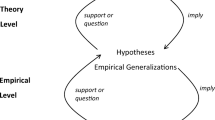Abstract
Jonathan Schaffer introduced a new type of causal structure called ‘trumping’. According to Schaffer, trumping is a species of causal preemption. Both Schaffer and I have argued that causation has a contrastive structure. In this paper, I analyze the structure of trumping cases from the perspective of contrastive causation, and argue that the case is much more complex than it first appears. Nonetheless, there is little reason to regard trumping as a species of causal preemption.
Similar content being viewed by others
References
Amstrong D. (1983) What is a law of nature?. Cambridge University Press, Cambridge
Carroll J. (1994) Laws of nature. Cambridge University Press, Cambridge
Dretske F. (1977a) Laws of nature. Philosophy of Science 64: 248–268
Dretske F. (1977b) Referring to events. Midwest Studies in Philosophy 2: 90–99
Hall N. (2007) Structural equations and causation. Philosophical Studies 132: 109–136
Halpern J., Pearl J. (2005) Causes and explanations: A structural-model approach. Part I: Causes. British Journal for the Philosophy of Science 56: 843–887
Hitchcock C. (1993) A generalized probabilistic theory of causal relevance. Synthese 97: 335–364
Hitchcock C. (1995) The mishap at Reichenbach fall: Singular vs. general causation. Philosophical Studies 78: 257–291
Hitchcock C. (1996a) The role of contrast in causal and explanatory claims. Synthese 107: 395–419
Hitchcock C. (1996b) Farewell to binary causation. Canadian Journal of Philosophy 26: 267–282
Hitchcock C. (2001) The intransitivity of causation revealed in equations and graphs. Journal of Philosophy 98(6): 273–299
Hitchcock C. (2007) Prevention, preemption, and the principle of sufficient reason. Philosophical Review 116: 495–532
Hitchcock C. (2009) Structural equations and causation: Six counterexamples. Philosophical Studies 144: 391–401
Lewis, D. (1973a). Causation. Journal of Philosophy, 70, 556–567. (Reprinted in Philosophical Papers, Vol. II, pp. 159–172, by D. Lewis, 1986, Oxford: Oxford University Press.)
Lewis D. (1973b) Counterfactuals. Harvard University Press, Cambridge, MA
Lewis, D. (1986a). Events. In Philosophical papers (Vol. II, pp. 241–269). Oxford: Oxford University Press.
Lewis, D. (1986b). Postscripts to ‘Causation’. In Philosophical papers (Vol. II, pp. 172–213). Oxford: Oxford University Press.
Lewis, D. (2000). Causation as influence. Journal of Philosophy, 97, 182–197. (Expanded version in Causation and counterfactuals, pp. 75–106, by J. Collins, N. Hall, & L. Paul, Eds., 2004, The MIT Press, Cambridge, MA.)
Maslen C. (2004) Causes, contrasts, and the nontransitivity of causation. In: Collins J., Hall N., Paul L. (eds) Causation and counterfactuals. The MIT Press, Cambridge, MA, pp 341–358
Maudlin T. (2007) The metaphysics within physics. Oxford University Press, Oxford
McDermott M. (1995) Redundant causation. British Journal for the Philosophy of Science 46: 523–544
McDermott M. (2002) Causation: Influence vs. sufficiency. Journal of Philosophy 99: 84–101
Menzies P. (1989) Probabilistic causation and causal processes: A critique of Lewis. Philosophy of Science 56: 642–663
Menzies P. (2004) Difference-making in context. In: Collins J., Hall N., Paul L. (eds) Causation and counterfactuals. The MIT Press, Cambridge, MA, pp 139–180
Noordhof P. (1999) Probabilistic causation, preemption, and counterfactuals. Mind 108: 95–125
Paul, L. (MS). Understanding trumping.
Ramachandran M. (1997) A counterfactual analysis of causation. Mind 106: 263–277
Schaffer, J. (2000). Trumping preemption. Journal of Philosophy, 97, 165–181. (Reprinted in Causation and counterfactuals, pp. 59–73, by J. Collins, N. Hall, & L. Paul, Eds., 2004, The MIT Press, Cambridge, MA.)
Schaffer J. (2003) Overdetermining causes. Philosophical Studies 114: 23–45
Schaffer J. (2005) Contrastive causation. Philosophical Review 114: 327–358
Tooley M. (1987) Causation: A realist approach. Oxford University Press, Oxford
Yablo S. (1992) Cause and essence. Synthese 93: 403–449
Author information
Authors and Affiliations
Corresponding author
Rights and permissions
About this article
Cite this article
Hitchcock, C. Trumping and contrastive causation. Synthese 181, 227–240 (2011). https://doi.org/10.1007/s11229-010-9799-y
Received:
Accepted:
Published:
Issue Date:
DOI: https://doi.org/10.1007/s11229-010-9799-y




